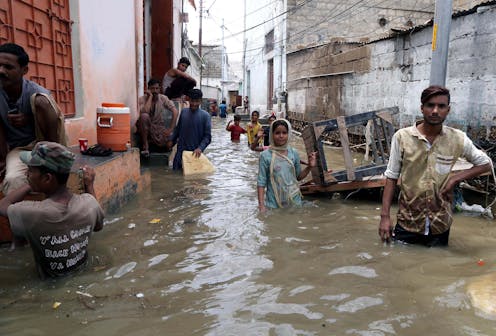COP28: health is finally on the agenda – but there's more to do as we face continued climate extremes
- Written by Kathryn Bowen, Professor - Environment, Climate and Global Health at Melbourne Climate Futures and Melbourne School of Population and Global Health, University of Melbourne, The University of Melbourne

As global leaders gather in Dubai for COP28, health has finally landed firmly on the climate change agenda, with the first “health day” at the annual UN climate summit taking place yesterday (December 3).
Including health in discussions on climate change has never been more important. Extreme weather threatens human health in a variety of ways, and this intersection is only getting worse as extreme weather events become more likely with climate change.
Two of us (Kathryn and Arthur) attended the health day. It represents a pivotal moment for climate and health on the global stage – but there’s still much work to do.
How climate change affects our health
The Lancet recently published its latest report on the health effects of climate change, and the news isn’t good.
The report reaffirms that substantial deaths and injuries due to climate change are already happening around the world. For example, heat-related deaths in people aged over 65 increased by 85% in 2013-2022 compared to 1991-2000.
The effects of climate change on health are wide-ranging. As well as harm from extreme heat, disasters such as droughts, floods and bushfires can lead to the spread of infectious diseases, exposure to bushfire smoke, food insecurity and more.
Events like these are also increasing mental health problems such as anxiety, depression and post traumatic stress disorder.
Minority and at-risk groups experience the worst health impacts, which widen existing social and health inequities.
Read more: COP28 climate summit just approved a 'loss and damage' fund. What does this mean?
A pivotal moment
This year has seen promising progress towards addressing the impact of climate change on health. In May, the World Health Assembly for the first time had a strong focus on health and climate change, including a roundtable on the role of the health community in climate action and the need for dedicated financing mechanisms.
In August, the G20 health ministers made climate and health a priority issue and agreed to the first ever high-level principles for health and climate action. These included building sustainable and low-carbon health systems that deliver high-quality health care, and decarbonising health-care supply chains.
Now, this inaugural health day at COP has sought to raise the profile of the health impacts of climate change, and to mobilise finances for effective action so countries can prepare and respond.
The day was focused around key topics including the avenues through which climate affects health, the health benefits of emissions reductions, as well as the needs, barriers and best practices for strengthening climate-resilient health systems.
A ministerial roundtable closed out the day, with many of the 50 health ministers who attended allocated two minutes to talk about why and how they are taking action on health and climate change.
For example, the representative for Vanuatu noted the country faces an uncertain future due to climate change, and highlighted their hope this health day would allow for continued support to countries at highest risk.
Japan noted the importance of strengthening universal health coverage as a key way to respond to the health impacts of climate change.
Read more: COP28: the climate summit’s first Health Day points to what needs to change in NZ
A declaration
Notably, this COP has seen more than 120 countries, including Australia, sign the COP28 UAE Declaration on Climate and Health. The declaration focuses on gathering support, galvanising action and mobilising finances to improve the resilience of health systems.
Along with this, the United Arab Emirates announced an “aggregated” funding commitment of US$1 billion for strengthened implementation of health-focused climate activities. This is facilitated by agencies including the Green Climate Fund, the Asian Development Bank and the Rockefeller Foundation.
However, scarce detail is available on whether this money will be additional to current commitments, will be considered a loan or a grant, or will be shifted from other health priorities.
Read more: 5 reasons why climate change may see more of us turn to alcohol and other drugs
In terms of Australian action, COP28 hosted the launch of the first National Health and Climate Strategy, which sets out a plan to decarbonise the country’s health system, as well as build resilience in the health system and communities to protect against the effects of climate change on health.
Australia has also finally signed up to the World Health Organization’s (WHO) Alliance for Transformative Action on Climate and Health, which began at COP26.
Protecting our planet, people and future
As WHO Director General Tedros Adhanom Ghebreyesus said yesterday, after 27 COPs without a serious discussion of health, the focus on health at COP28 is well overdue.
Undoubtedly, health stands as the most compelling reason for taking climate action […] For too long, health has been a footnote in climate discussions.
But while the health day and other recent developments are encouraging, there’s much more to be done to meaningfully protect the health of communities around the world.
Notably, the rapid phasing out of fossil fuels is vital if climate-related health impacts are to ease. And the global declaration mentioned above doesn’t set out any plan for this or address the urgency of fossil fuel phase-out.
The health sector can and must contribute to this endeavour given it’s responsible for 4.4% of global carbon emissions.
We know the health benefits of climate action far outweigh the costs. Without ambitious cross-sectoral action that considers health outcomes, human health and wellbeing will continue to suffer. This is the first health day at COP, but it must not be the last.
Authors: Kathryn Bowen, Professor - Environment, Climate and Global Health at Melbourne Climate Futures and Melbourne School of Population and Global Health, University of Melbourne, The University of Melbourne




